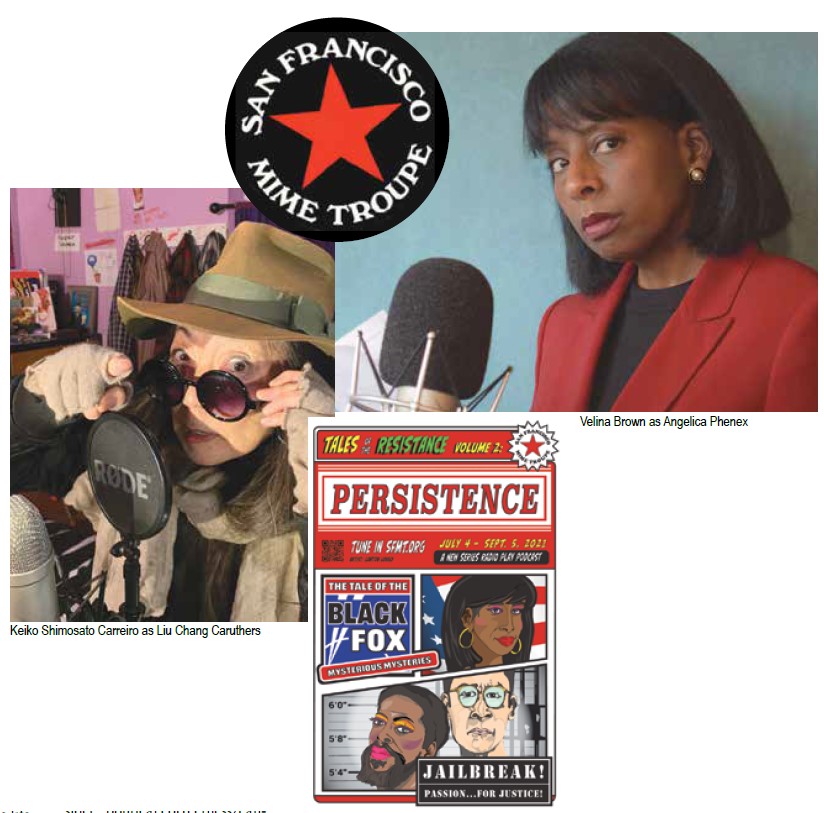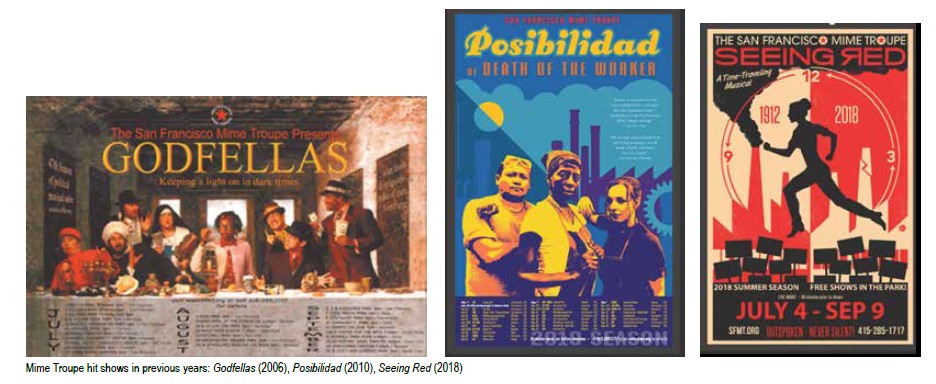
By Robert Holgate and Jennifer Kroot–
The San Francisco Mime Troupe is the city’s legendary, activist theater troupe. Founded in 1959, SFMT satirizes politics through a working-class voice, and is famous for speaking truth to power. FYI, SFMT does not do silent pantomime. Au contraire! Their voice is loud, clear, and funny.
Traditionally, SFMT’s live performances are very physical and visual, but during the pandemic they switched to audio plays. Their new season, Tales of the Resistance 2, is available now at https://www.sfmt.org/talesvol2
We connected with some of the multi-talented women members to hear how the Troupe has persevered through the pandemic.
Jennifer & Robert: How did SFMT’s transition from live theater to audio plays go?
Lisa Hori-Garcia: Not as big of a challenge as we originally thought, though there was a large learning curve on the technical side. However, audio plays enabled us to reconnect remotely with our larger Mime Troupe family, so we’ve been able to work with former members who moved away.
Marissa Ellison: Technology, man … . We are a big group, with varying levels of technological comfort. Luckily, our tech blunders also created some wonderfully memorable moments! I hope these audio plays never stop. It’s exciting that our work is so accessible. If it’s not on a station near you, you can always hop on our website to listen to episodes!

Jennifer & Robert: Has SFMT always had strong female characters?
Ellen Callas: Since I’ve been in the Troupe, yes, always strong women, reflecting our strong women members.
Marissa: It’s not hard to have bomb women roles when you have an amazing group of bomb women to play them!
Ellen Callas: Having women playwrights helped. The change came in 1970 when SFMT created An Independent Female at the height of the women’s movement—the same time the Troupe became a collective.
Karen Runk: There’s always been an interest in strong characters, period.
Jennifer & Robert: Who are your favorite female characters this season?
Marie Cartier: I wrote the episode Hobos in Space based on my work as a service provider for people experiencing homelessness, and my love of Star Trek. There are two strong women roles: a young, idealistic counselor who stands up to a brutally unfair system, and an older woman who’s worked her whole life, but refuses to take any s–t.
Karen Runk: In the spirit of Bart Simpson (who is played by a woman), we have the character Little Jimmy, played by Ellen Callas, in several episodes this year.
Keiko Shimosato Carreiro: I had fun playing the part of Eido Kawakami in The Black Fox. And I really enjoy Velina Brown’s character, Angelica.
Velina Brown: Angelica is a highly ambitious African American woman who identifies as a conservative Republican. She has parlayed her willingness to sell out Black people, women, and anyone who has to work for a living, into a high-profile position on a conservative news network. Angelica promotes extreme, anti-Black sentiments that white media personalities could never get away with. She gives cover to folks who promote racist, sexist, classist ideas, and is highly rewarded for this.

Jennifer & Robert: In this era of political correctness, is it challenging to write funny scripts?
Lisa Hori-Garcia: We do consider “political correctness/cancel culture” when tackling how to make a subject or situation comical—not because we’re into censoring ourselves, no! We investigate the ridiculousness of “today” and satirize it. We understand some people in our audience won’t like or agree with a certain stance—we can’t please everyone—but in comedy and politics you’re bound to trigger someone.
Velina Brown: Right now, the behaviors of real people are so extreme that you can’t really exaggerate them. People who punch down with their humor complain the most about the constraints of “political correctness.” If you are punching up, the issue isn’t political correctness as much as whether you are willing to take the risks involved with speaking truth to power.
Jennifer & Robert: Besides acting, it sounds like you all “wear many hats”?
Keiko Shimosato Carreiro: Yes.I’m an actor, director, and designer. We’re all caretakers of the building, truck loaders, janitorial staff, etc. Ha! When I first began at SFMT, I was 26 and had all the time in the world to devote to it. The cost of living in San Francisco in the late 80s was also so much cheaper (sigh). I spent most of my days with the Troupe. Nowadays, I have so many “real” jobs to enable me to live in San Francisco that I can’t spend as much time with the troupe—except for when we’re on salary and in production for our summer show.
Jennifer & Robert: So, how do you stay hopeful in a city with so much inequity?
Keiko Shimosato Carreiro: I’m teaching a class, “Theater for Social Change,” and when the inequities in San Francisco threaten to melt my brain, it’s heartening to know that my students are willing to risk entering into careers of creating political art. They feel it’s worthy to speak out against injustice.
Ellen Callas: It’s not easy to stay hopeful in general these days. There’s a lot of bad news out there. It would be great if there was more focus on San Francisco little guys, rather than chasing big corporations, to whom we give big tax breaks and then they move their headquarters when the tax moratorium is over. That tax money could’ve helped a lot of city issues, from homelessness to infrastructure.
San Francisco has a long history of backroom politics that seems opposed to its progressive ideals. I hope post-COVID San Francisco can resurface as a more equitable, fair, and livable place for all of us under the triple digit bracket.
And, I always remain hopeful—I believe it’s my duty as an artist.
Jennifer Kroot is a filmmaker known for her award-winning LGBTQ themed documentaries, including “The Untold Tales of Armistead Maupin” and “To Be Takei.” She studied filmmaking at the San Francisco Art Institute, where she has also taught. She is a member of The Academy of Motion Picture Arts and Sciences.
A humanitarian, as well as a designer, Robert Holgate is dedicated to critical social issues. With his hands-on approach to philanthropy and social justice, he supports the advancement of local and national social causes. For more information: https://www.rhdsf.com/
Published on August 12, 2021
Recent Comments